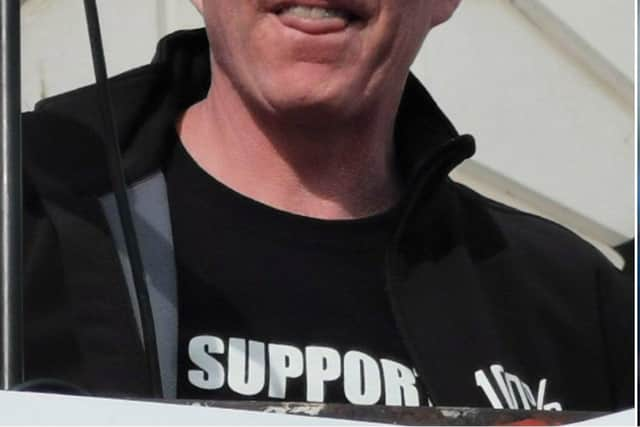Families need ‘way out’ of MICA nightmare, Donegal reps tell Oireachtas committee
and live on Freeview channel 276
Michael Doherty was speaking as he gave evidence alongside fellow Mica Action Group members Aidan Houton and, via videolink, Professor Paul Dunlop, alongside representatives from other counties affected by Defective Blocks to the Oireachtas Committee following the publication earlier this week of the remediation bill the government intends to table.
Speaking at the meeting of the Joint Committee on Housing, Local Government and Heritage yesterday afternoon, Mr Doherty told the Committee: “We have around 7,000 affected homes. These primarily arose during the Celtic Tiger years.
Advertisement
Hide AdAdvertisement
Hide Ad“The regulations that should have protected consumers did not and homeowners were unknowingly exposed to defective products destined to fail on the biggest and most significant purchases of their lives.”


He said the so-called 90-10 scheme ended up a 60-40 scheme which was ‘rightfully rejected’, and spoke of the massive campaign which saw over 20,000 arrive on the streets of Dublin to demand 100% redress, which led to the government setting up a working group and later the revised scheme which he warned contained red tape, caps and exclusions which left it “simply unworkable” and leaving homeowners exposed to inflation.
He warned that there was a significant difference between eligible costs and true costs.
He said there was no allowance for other materials, including foundations replacement, or other vital block structures like walls and garages ‘all equally capable of killing members of our young families as they subside and fall over time’, ‘and not even a carpet allowed for in the home by way of finish’.
Advertisement
Hide AdAdvertisement
Hide AdHe said the grant as it stands at current rates represents more like an 80% grant, leaving homeowners having to find tens of thousands of pounds. “To compensate,” he said, “homeowners requested a penalty free downswing option that would allow the grant based on their current home size to be re-directed to building themselves a smaller home. Instead the government saw fit to hold back on the grant amount they were already prepared to give and instead to provide a smaller grant against a smaller home leaving the homeowner with the same problem.”


He warned that the protocol has not allowed for the appearance of other pertinent deleterious materials like pyrrhotite.
“We have excluded homes, many of our rental homes are not eligible, small buy to let landlords cannot afford to replace these homes and their tenants have nowhere to go. Holiday. retirement homes, some inherited homes and homes occupied by vulnerable adults that are not classed as their principle private residences are also excluded from the scheme as it stands. These are equally innocent victims of unfit products entering the market for years. While they are not demanding that they are pushed to the front of others, they are rightfully demanding that they are not excluded from the scheme. Prioritisation? Yes. Exclusion? No.”
He said the homeowners have entered into talks in good faith and said families are stressed to breaking point. “They have endured years of uncertainty and anxiety, in every possible description. This scheme should be a way out of this nightmare. Instead it is an inflexible, cynical, illogical and blinkered approach burdening homeowners with yet more stress,” he claimed, asking: “Where is the empathy from the State?”
Advertisement
Hide AdAdvertisement
Hide AdAidan Houton provided the committee with a breakdown of real costs per square foot for rebuilding, which he said at today’s prices come in at between 180 euro per square foot, rising to 210 euro per square foot for smaller homes.


Concerns were also raised at the meeting over some of the contents of the published bill report with regards to people potentially seeking redress beyond the scheme and the implications this would have for eligibility.
MAG and the other representatives who testified yesterday implored the committee to forward recommendations to the Minister that address the issues they detailed at the meeting.
“After ten years of heartache, allow us a path to restore our lives, a path to 100% redress, no less,” Mr Doherty urged.
What’s in the Bill?
Advertisement
Hide AdAdvertisement
Hide AdThe proposed ‘General Scheme of a Remediation of Dwellings Damaged by Defective Concrete Blocks Bill 2022’ was published on Tuesday of this week by the Department of Housing, Local Government and Heritage.
It is summarised by the government as ‘an Act to provide for the payment of grants for the remediation of dwellings damaged by defective concrete blocks and to provide for related matters to be enacted by the Oireachtas’. Below are some of the key details and summations contained within the lengthy Act.
It states that the Defective Concrete Blocks Grants Scheme will apply only to a ‘relevant dwelling which must have been completed prior to the 31 January, 2020 and to which damage arose out of, or in connection with, the use of defective concrete blocks in its construction’. The scheme does not include a building or part of a building that is not permanently attached to a dwelling or that is an unauthorised structure, garages, car parks, gardens, patios, a building that provides multi-occupancy accommodation. Hotels, hostels and nursing homes are excluded. Further to this, the eligible homes are limited to principal residences and the scheme will only apply to two classes of owners - the owner of a home and the owner of a residence which is rented and the tenancy was registered with the Residential Tenancies Board on November 1, 2021. There is a limit of one rental property and one principal private residence per relevant owner / household.
Only counties Donegal and Mayo are covered by the current scheme (S.I.25/2020), with Clare and Limerick, following submissions, now recommended for inclusion, and Sligo currently preparing a submission for inclusion.
Advertisement
Hide AdAdvertisement
Hide AdIn terms of process, it states: ‘Applications will be made by homeowners to the relevant local authority and will have to be accompanied by a building condition assessment report prepared by a competent building professional, a completed application form and statutory declaration, consent to inspection and testing of the relevant dwelling and such other information as may be requested by the local authority. The local authority will carry out a validation of the application considering issues as to whether the home is a relevant dwelling and the owner a relevant owner under the definitions in the Act. They will also ensure that all reports required to make the assessment have been submitted and the application form is fully complete. If the application is validated by the local authority it will then be submitted to the Housing Agency for them to assess the merits of the application. If the application is not validated the local authority will refuse it. The homeowner must be notified of the local authorities’ decision as soon as possible.’
A first time application under the grant scheme will have to be made within 15 years following the date of commencement of this section of the Act.
The published Act states that the overall maximum grant payable to a relevant owner of a relevant dwelling shall not exceed €420,000 or 100% of the costs in accordance with subsections (3) to (15) or the actual cost, whichever is the lesser. The Act states: ‘The current scheme has 5 distinct remediation options which are taken from I.S. 465 standard. The standard also allow for blended options.
This head sets out the overall grant calculation methodology and rates which apply for each remediation option. The grant available to homeowners will be based on construction cost rates per sq.mt and the size of the existing home in the case of demolition and rebuild and construction cost rates for blockwork removal and replacement and the amount of blockwork being replaced in the home in the case of other remediation options. The highest order remediation option is Option 1 which involves demolition of the homedown to foundation level and rebuild.’
Advertisement
Hide AdAdvertisement
Hide AdThe grant calculation methodology is based on a cost per square metre for the rebuild of home based on the existing home size.
Remediation Options 2 -5 involve the removal and replacement of defective and damaged blockwork. The grant calculation methodology is based on a cost per square metre of blockwork to be removed and replaced.
Within the overall maximum grant cap of €420,000, grant funding is also available for alternative accommodation costs (up €15,000), storage costs (up to €5,000) and essential immediate repair works (up to €5,000) or 100% of the actual cost, whichever is the lesser. The I.S. 465 standard is under review and the number and type of remediation options could change in the future.
The Minister will prescribe the grant rates. The Minister may, by Government order, revise the overall maximum grant amount of €420,000 and the grant rates not more than once every 12 months. The Minister can make three such orders after which a resolution of the Oireachtas will be required for making a maximum of three further orders.
Advertisement
Hide AdAdvertisement
Hide AdThere will be an onus on a local authority to proportionally reduce the overall grant amount approved where the relevant dwelling is being demolished and rebuilt to a size smaller than that for which the grant amount was calculated.
In the explanatory notes it states: “The homeowner may proceed with the remediation option approved by the local authority but they may also undertake additional works. For example, they may be approved for grant assistance to demolish and rebuild external walls down to the foundation but they decide they wish to demolish the entire building and rebuild. The homeowner would have to fund
the difference between the grant approved and the cost of any additional works. The homeowner will not be grant aided where works carried out are less than those approved or are not carried out on the existing foundations.
An applicant has 18 months to commence works after approval before the grant approval is deemed withdrawn. A further period of three months may be granted by the local authority where exceptional circumstances beyond the control of the applicant arise.
Advertisement
Hide AdAdvertisement
Hide AdA second Grant Application can be made by those carrying out remediation works if within 40 years there is subsequent manifest damage to blockwork retained in the relevant dwelling following the initial remediation works, which arises from the use of defective concrete blocks subject to conditions.
A clawback provision applies in respect of rented dwellings registered with the RTB at the 1 November, 2021.
Owners of rented dwellings who wish to access the grant scheme will have to consent to a charging order giving effect to the clawback provisions.The Act states that the clawback is provided for to try and ensure that the rented dwelling remains within the rental sector and within the ownership of the original grant applicant.
There will be a 10 person appeal panel and an Appeals Board established.
There is no provision in the Bill for holiday home owners.
There is no mention in relation to pyrrhotite.
Advertisement
Hide AdAdvertisement
Hide AdThe Act states an applicant can be barred from the scheme for five years, fined up to 50,000 euro or jailed for up to 12 months if information known to be ‘false and misleading’ or ‘being reckless as to whether it is’ is identified.
